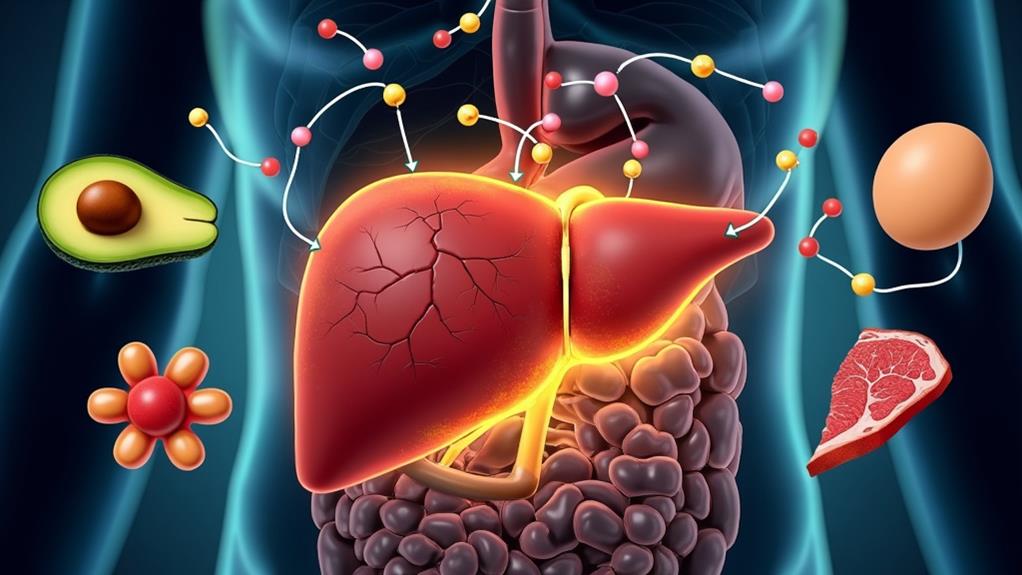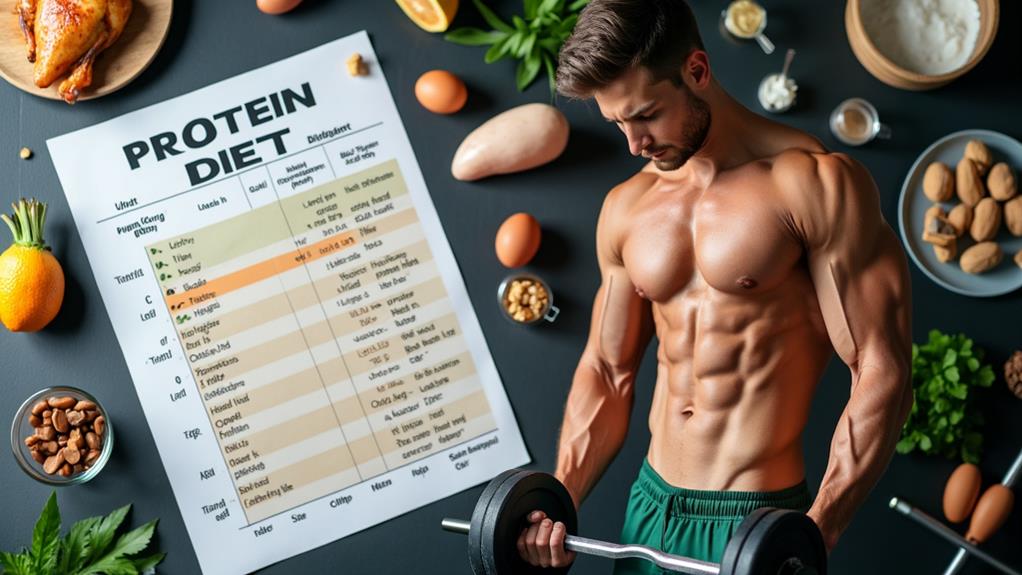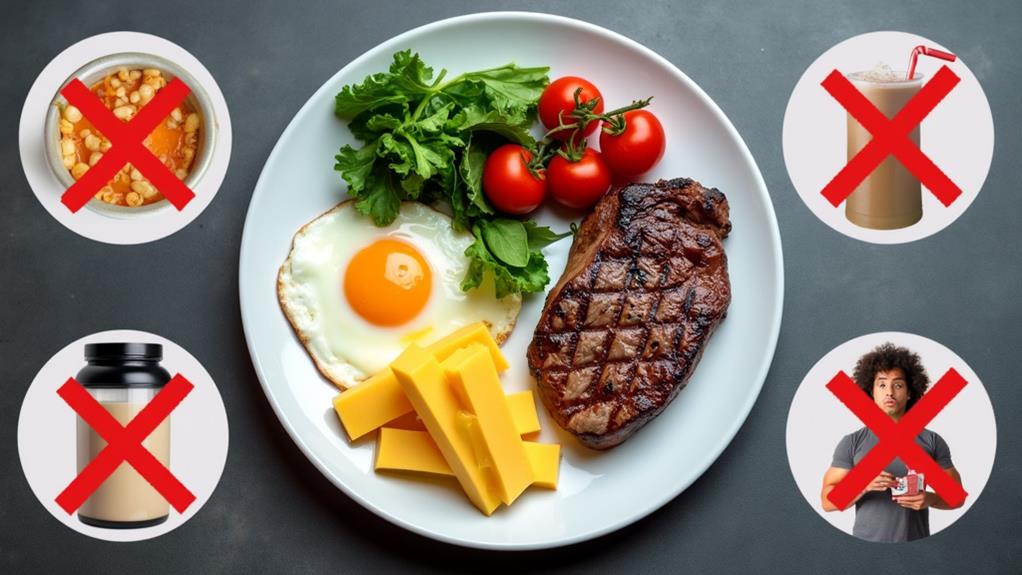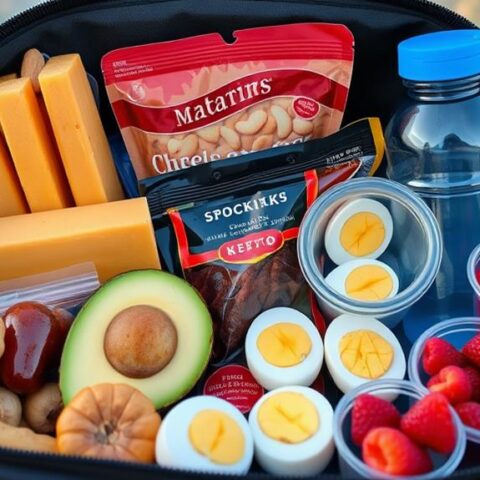
On a ketogenic diet, protein intake should make up about 20-25% of your total caloric consumption. For most individuals, this translates to roughly 1.2 to 2.0 grams of protein per kilogram of target body weight. Active individuals might need up to 2.4-3.0 grams per kilogram to preserve lean mass and support muscle synthesis. Distributing protein intake evenly throughout the day, with 15-25 grams per meal, is advisable for best results. Carefully balanced protein consumption supports ketosis without overpowering it through gluconeogenesis. Learn more about enhancing your keto diet with precise protein guidelines and recommendations.
Key Takeaways
- Aim for 1.2 to 2.0 grams of protein per kilogram of target body weight.
- Distribute protein intake evenly across meals, about 15-25 grams per meal.
- Protein should constitute 20-25% of total daily caloric intake.
- Higher protein intake (2.4-3.0 g/kg) may be needed for weight loss and active individuals.
- Excess protein can disrupt ketosis through gluconeogenesis, so balance is key.
Importance of Protein
Understanding the importance of protein in a ketogenic diet is essential for achieving ideal health and fitness outcomes. Protein is an indispensable macronutrient that plays a crucial role in tissue building, healing, and muscle growth, making it important for individuals adhering to a ketogenic lifestyle.
A favorable protein intake, constituting 20-25% of total caloric consumption, guarantees that the body receives adequate amino acids necessary for these physiological processes. The quality of protein consumed is significant, as high-quality sources provide a complete profile of essential amino acids, supporting muscle maintenance and overall health.
For active individuals, a recommended protein intake of 1.6 to 2.0 grams per kilogram of body weight is necessary to sustain muscle mass and promote recovery. Additionally, distributing protein intake evenly across meals (15-25 grams) can help enhance muscle synthesis and maintain ketosis.
Furthermore, protein timing can further increase these benefits; distributing protein intake evenly across meals can aid in maintaining satiety, regulating hunger, and supporting metabolic rate.
Adequate protein consumption also plays a key role in maintaining satiety by slowing digestion, thereby aiding in hunger management and promoting weight loss. By supporting metabolic rate during caloric restriction, protein helps prevent muscle loss, securing the preservation of lean mass while the body remains in ketosis.
Keto Diet Basics
Keto Diet Basics
Characterized by a strategic macronutrient distribution, the ketogenic diet focuses on high fat, moderate protein, and minimal carbohydrates to induce ketosis—a metabolic state where fat becomes the primary fuel source instead of glucose. This dietary approach typically includes a macronutrient breakdown of approximately 70-80% fat, 10-20% protein, and 5-10% carbohydrates.
The keto diet history dates back to the 19th century for diabetes management and was later adapted in the 1920s for epilepsy treatment. Today, it is widely recognized for its potential benefits in weight loss and metabolic health improvement.
To achieve and maintain ketosis, daily carbohydrate intake is generally restricted to less than 50 grams. Key ketogenic food choices include fatty meats, avocados, nuts, seeds, and low-carb vegetables. These foods support the high-fat requirement while keeping carbohydrate intake minimal.
Protein is also essential for muscle maintenance and recovery, as well as for enzyme production and overall health. The body still needs a small amount of glucose for essential functions, which is generated through gluconeogenesis—a process that converts protein into glucose without disrupting ketosis.
Adhering to the ketogenic diet can be challenging, especially due to potential carbohydrate withdrawal symptoms. As a result, careful planning and attention to nutritional balance are vital to guarantee successful and sustainable adherence to the diet.
Protein Requirements
When determining protein requirements on a ketogenic diet, it is essential to adhere to the recommended intake of 1.2 to 2.0 grams per kilogram of target body weight, with adjustments up to 3.0 g/kg for highly active individuals or those in a caloric deficit.
Protein should account for approximately 20-25% of total caloric intake, supporting muscle maintenance and essential metabolic functions.
For ideal health, consider including nutrient-rich options like fatty fish and fresh meats.
To maintain ketosis while enhancing muscle protein synthesis, it is advisable to distribute protein intake evenly throughout the day, targeting 15-25 grams per meal.
Optimal Protein Intake
Determining ideal protein intake on a ketogenic diet is essential for achieving desired health and fitness outcomes. Protein requirements on a keto diet typically range from 1.2 to 2.0 grams per kilogram of target body weight. For individuals engaged in intense training or those in caloric deficits, higher intake within this range is recommended. Protein timing and protein quality are vital for maximizing muscle maintenance and recovery. Evidence suggests that active individuals should aim for approximately 1.6 grams of protein per kilogram of body weight.
A common macronutrient distribution for a ketogenic diet is 20-25% protein, 70-80% fat, and 5-10% carbohydrates. It is important to calculate protein needs based on ideal body weight, especially for overweight or obese individuals. Consuming 15-25 grams of protein per meal can effectively stimulate muscle protein synthesis and maintain satiety.
| Activity Level | Protein Intake (g/kg) | Target Protein Per Meal (g) |
|---|---|---|
| Sedentary | 1.2 | 15-20 |
| Moderately Active | 1.4 | 15-25 |
| Active | 1.6 | 20-25 |
| Intense Training | 2.0 | 20-25 |
Balancing Protein Levels
Balancing protein levels on a ketogenic diet is vital to maintain muscle mass and support metabolic health without compromising the state of ketosis. The recommended protein intake typically ranges from 1.5 to 2.0 grams per kilogram of ideal body weight. This guarantees adequate muscle maintenance without disrupting ketosis.
Protein should constitute approximately 20-25% of total caloric intake, while fats account for 65-80% and carbohydrates 3-10%. Calculating protein needs based on ideal body weight, especially for those who are overweight, is significant for achieving a favorable balance.
Additionally, spreading protein intake evenly across meals, aiming for 15-25 grams per meal, can enhance muscle protein synthesis and absorption.
For active individuals, particularly those engaged in resistance training, higher protein intakes of 1.6 to 3.0 grams per kilogram of body weight may be necessary to prevent muscle loss during caloric deficits. Emphasizing protein timing and protein quality can also improve outcomes.
- Ideal body weight should guide protein calculations.
- Protein should make up 20-25% of total caloric intake.
- Even distribution of protein across meals is beneficial.
- Active individuals may require higher protein intakes.
Protein and Ketosis
Understanding the delicate balance of protein intake is essential for maintaining ketosis, as protein plays a pivotal role in muscle preservation and metabolic functions.
Consuming protein within the recommended range of 1.2 to 2.0 grams per kilogram of target body weight helps support these needs without triggering gluconeogenesis, which can disrupt ketosis.
For instance, excess protein consumption can lead to glucose conversion, potentially disrupting the state of ketosis.
Integrating protein with dietary fats in mixed meals further aids in stabilizing blood sugar levels, thereby promoting a more effective ketogenic state.
Protein's Role in Ketosis
While starting a ketogenic diet, achieving the right balance of macronutrients is crucial, and protein plays a key role in maintaining ketosis. Proper protein intake is vital, typically ranging from 1.2 to 2.0 grams per kilogram of target body weight. This level helps preserve muscle mass without greatly disrupting ketosis.
Ideal protein timing, such as spreading intake throughout the day, guarantees steady energy levels and minimizes muscle loss during weight loss phases.
Key aspects of protein's role in ketosis include:
- Protein Quality: High-quality protein sources, such as lean meats, fish, and eggs, provide essential amino acids necessary for muscle maintenance.
- Gluconeogenesis Impact: While high protein levels can theoretically increase blood sugar via gluconeogenesis, moderate consumption supports ketosis.
- Macronutrient Breakdown: A typical ketogenic diet allocates 20-25% of total calories to protein, balancing adequate intake without triggering excess glucose production.
- Individual Variability: Responses to protein can vary, particularly in individuals with diabetes, necessitating personalized adjustments to maintain ketosis effectively.
Balancing Protein Intake
Achieving the ideal balance of protein intake is vital to maintaining ketosis while supporting overall health on a ketogenic diet. The recommended protein intake ranges from 1.2 to 2.0 grams per kilogram of target body weight. This range guarantees sufficient protein to maintain muscle mass and support metabolic functions without hindering ketosis through gluconeogenesis.
Incorporating 20-30% of total caloric intake from protein helps promote fat utilization for energy. Spreading protein intake evenly throughout the day, a practice known as protein timing, enhances muscle protein synthesis. This approach supports overall metabolic health and provides a steady supply of amino acids.
Monitoring individual responses is essential, as protein needs can vary based on factors like activity level, body composition, and health conditions. Confirming protein quality is also important; high-quality protein sources, such as lean meats, fish, and dairy, provide essential amino acids necessary for peak body function.
| Protein Intake | Timing | Quality |
|---|---|---|
| 1.2-2.0 g/kg | Evenly | High |
| 20-30% calories | Throughout day | Essential amino acids |
| Monitor individual needs | Supports muscle synthesis | Lean meats, fish, dairy |
Balancing protein intake with these considerations helps maintain ketosis while promoting overall health and muscle maintenance.
Avoiding Protein Overconsumption
Excessive protein consumption on a ketogenic diet can undermine the state of ketosis by initiating gluconeogenesis, a metabolic process where surplus amino acids are converted into glucose. This conversion can potentially raise blood sugar levels, disrupting ketosis.
To maintain ketosis, it is generally recommended to limit protein intake to about 20-25% of daily calories, roughly 1.5-2.0 grams per kilogram of target body weight.
Proper protein timing and quality are essential to avoid overconsumption. Consuming more than 30 grams of protein in a single meal can lead to increased blood sugar spikes, especially in individuals with diabetes.
To mitigate this risk, spread protein intake evenly throughout the day. Focus on high-quality protein sources to guarantee adequate muscle maintenance and satiety without the need for excessive amounts.
- Monitor total daily protein intake: Aim for 1.5-2.0 grams per kilogram of target body weight.
- Avoid large protein-heavy meals: Limit protein to 30 grams per meal to maintain stable blood sugar levels.
- Prioritize protein quality: Choose nutrient-dense, high-quality protein sources.
- Distribute protein intake: Spread protein consumption evenly throughout the day.
Gluconeogenesis Explained

Gluconeogenesis (GNG) is a significant metabolic process, particularly for individuals adhering to a ketogenic diet. The gluconeogenesis process converts non-carbohydrate sources, mainly amino acids from dietary protein, into glucose. This conversion is essential for maintaining fundamental bodily functions that require glucose, such as brain activity and red blood cell production, especially when carbohydrate intake is restricted to less than 50 grams per day.
GNG is also integral in maintaining stabilized insulin levels, which helps reduce hunger and cravings. Additionally, the ketogenic diet's high-fat and protein foods digest slowly, leading to prolonged feelings of fullness.
The metabolic significance of GNG cannot be overstated, as it guarantees the maintenance of blood glucose levels during periods of low carbohydrate consumption, thereby preventing hypoglycemia. This process also allows the body to replenish glycogen stores without the need for dietary carbohydrates.
However, while GNG is necessary for overall health, it must be carefully managed. Excessive protein intake can lead to increased gluconeogenesis, potentially disrupting ketosis by providing more glucose than the body requires, which may inhibit the fat-burning state essential for a ketogenic diet.
Understanding the balance of GNG is important for effectively adhering to a ketogenic diet. By managing protein intake, individuals can guarantee they maintain ketosis, prevent muscle loss, and support their body's glucose needs without compromising their metabolic goals.
Calculating Protein Intake
Calculating protein intake on a ketogenic diet is vital for achieving metabolic balance and guaranteeing the body remains in a state of ketosis. It is recommended to consume 1.5-2.0 grams of protein per kilogram of target body weight to prevent excessive gluconeogenesis, which could hinder ketosis.
For those pursuing weight loss, a higher intake of 2.4 to 3.0 grams per kilogram is advisable to preserve lean mass during caloric deficits.
Given the importance of insulin sensitivity, maintaining an appropriate protein intake can support metabolic health and diabetes management.
For individuals engaged in resistance training, protein intake should be at the upper end, around 1.6-2.0 grams per kilogram, to support muscle maintenance. Proper meal timing and distribution of protein throughout the day are essential, with 15-25 grams of protein per meal optimizing muscle protein synthesis.
To guarantee accurate and personalized macronutrient calculations, dietary tracking apps can be invaluable. These tools help align protein intake with individual health goals and activity levels.
- General Recommendation: 1.5-2.0 grams per kilogram of target body weight.
- Weight Loss Aim: 2.4-3.0 grams per kilogram of body weight.
- Resistance Training: 1.6-2.0 grams per kilogram of body weight.
- Meal Timing: Distribute protein evenly, 15-25 grams per meal.
This structured approach to calculating protein intake helps maintain ketosis and supports overall health and fitness goals.
Protein for Muscle Maintenance

Adequate protein intake is critical for muscle maintenance on a ketogenic diet, with ideal levels typically ranging from 1.2 to 2.0 grams per kilogram of target body weight.
For those engaged in resistance training or experiencing higher physical activity, consuming 1.6 to 2.4 grams per kilogram can prevent muscle loss and support recovery.
Structured meal plans should consist of high-quality protein sources, such as eggs, fatty fish, and meat, with each meal containing 25-35 grams of protein.
Insufficient protein consumption can result in muscle mass loss, fatigue, and a slower metabolic rate, particularly during calorie restriction and weight loss phases.
Optimal Protein Intake
Determining the ideal protein intake on a ketogenic diet is vital for maintaining muscle mass and overall metabolic health. For most individuals, protein should comprise 20-25% of total caloric intake, translating to approximately 1.5-2.0 grams of protein per kilogram of target body weight. This not only supports muscle maintenance but also guarantees metabolic efficiency.
For those engaged in resistance training, higher protein intakes of 1.6 to 2.4 grams per kilogram are recommended to prevent muscle loss, especially during caloric restriction.
Additionally, older adults and individuals recovering from injuries may require even higher levels, ranging from 1.2 to 3.0 grams per kilogram, to combat sarcopenia and aid in recovery.
To maximize muscle protein synthesis, it is important to focus on both protein timing and protein quality. Consuming protein evenly across meals, aiming for 15-25 grams per meal, helps stimulate muscle protein synthesis and maintain satiety.
High-quality protein sources such as lean meats, dairy, and eggs should be prioritized.
- 20-25% of total caloric intake
- 1.5-2.0 grams per kilogram of target body weight
- 1.6 to 2.4 grams per kilogram for resistance training
- 1.2 to 3.0 grams per kilogram for older adults and injury recovery
Preventing Muscle Loss
Guaranteeing muscle preservation on a ketogenic diet necessitates a strategic approach to protein intake. Adequate protein intake is fundamental, with recommendations suggesting 1.6 to 2.0 grams of protein per kilogram of body weight to maintain lean mass during weight loss. This targeted intake is vital to avert muscle catabolism, which can otherwise lead to increased fatigue and a slower metabolic rate, potentially impeding weight loss efforts.
To optimize muscle preservation, protein timing plays an important role. Distributing protein consumption evenly throughout the day, ideally in portions of 20-30 grams per meal, enhances muscle protein synthesis. This practice guarantees that the body continuously receives the necessary amino acids to support muscle maintenance and repair.
Furthermore, integrating resistance training with sufficient protein intake—around 1.6 to 2.2 grams per kilogram—can greatly bolster muscle preservation, especially when in a caloric deficit.
For older adults and individuals recovering from injuries, higher protein levels, up to 1.2-2.0 grams per kilogram, are recommended to mitigate the risk of sarcopenia and support healing processes.
Special Protein Needs
When tailoring protein intake for individuals on a ketogenic diet, specific populations have unique requirements that must be meticulously considered. Understanding protein timing and protein types is essential for optimizing health outcomes in these groups.
For instance, individuals aiming to maintain muscle mass during weight loss should consume between 1.6 to 2.4 g/kg of body weight in protein to prevent muscle loss. Older adults, who are at risk of sarcopenia, might benefit from an even higher intake, typically around 1.2 g/kg of body weight or more, depending on their activity levels.
Given the keto diet's potential to improve insulin sensitivity and reduce HbA1c levels, adjusting protein intake accordingly can further enhance its benefits, especially for diabetics.
Special populations that require careful consideration include:
- Older Adults: An increased protein intake can help combat age-related muscle loss.
- Type 2 Diabetics: Raised protein levels may aid in blood sugar regulation and satiety.
- Individuals with Cardiovascular Risks: Higher protein can contribute to better health outcomes.
- Active Individuals: Those engaged in resistance training may need 2.0 to 3.0 g/kg for muscle repair and growth.
It is also significant for individuals with kidney disease to consult healthcare professionals for personalized recommendations, as high protein intake might need to be moderated to avoid further health complications.
Protein and Intense Training

Intense training amplifies the body's demand for protein, necessitating a more strategic approach to protein consumption for those following a ketogenic diet. Research highlights that individuals engaged in regular strength training or high-intensity workouts require 1.6 to 2.2 grams of protein per kilogram of body weight. This is vital for muscle repair and recovery.
For elite athletes, protein intake can be adjusted according to training cycles, with 1.6-2.0 grams per kilogram being ideal for enhancing muscle protein synthesis post-exercise. During the initial adaptation phase, athletes might also experience fatigue and performance dips, making protein intake even more essential for recovery.
Protein timing plays a pivotal role in recovery strategies. Consuming 20-30 grams of protein shortly after intense training sessions has been shown to maximize muscle repair and growth. This immediate post-workout protein intake is critical to leverage the anabolic window, promoting efficient muscle recovery.
However, those on a ketogenic diet must carefully balance their protein intake to avoid excessive gluconeogenesis, which can disrupt ketosis. As a result, tracking and adjusting protein consumption based on training intensity and individual body composition is important.
This guarantees ideal performance and adherence to ketogenic principles, allowing individuals to meet their fitness goals without compromising their dietary framework.
Keto-Friendly Protein Sources
A variety of keto-friendly protein sources can support the dietary needs of individuals following a ketogenic diet while ensuring they remain in ketosis. These sources are essential for maintaining muscle mass, supporting metabolic functions, and promoting satiety.
Fatty cuts of meat, such as ribeye and pork belly, are excellent choices as they provide high protein content without exceeding the fat limits required for a ketogenic diet. For those engaging in keto meal prepping, incorporating these meats can streamline efforts while delivering essential nutrients. Fresh meat and poultry are also rich in B vitamins and essential minerals, which support muscle mass preservation and cardiovascular health.
Eggs are another versatile and accessible option, offering approximately 6 grams of protein each. They can be integrated into various keto recipes, making them a staple for both main meals and protein-rich snacks.
Fish, particularly fatty varieties like salmon and mackerel, are beneficial due to their high protein content (around 22 grams per 100 grams) and their provision of omega-3 fatty acids, which support overall health.
Dairy products, such as Greek yogurt and cottage cheese, can contribute around 20 grams of protein per serving when choosing full-fat options with minimal carbohydrates. Additionally, nuts and seeds, such as almonds and chia seeds, offer approximately 6 grams of protein per ounce and serve as convenient, nutrient-dense snacks.
- Fatty cuts of meat (ribeye, pork belly)
- Eggs
- Fatty fish (salmon, mackerel)
- Full-fat dairy products (Greek yogurt, cottage cheese)
Incorporating these keto-friendly protein sources can enhance dietary adherence and nutritional balance.
Common Mistakes to Avoid

Steering through the ketogenic diet effectively requires avoiding several common pitfalls that can hinder progress and overall health. One frequent error is consuming excessive protein, which stimulates gluconeogenesis, potentially disrupting ketosis. Adhering to the recommended protein intake of 1.5-2.0 g/kg of body weight is essential to maintain metabolic balance.
It's also important to remember that the restrictive nature of the keto diet can lead to deficiencies in nutrients like calcium and magnesium, so a well-planned diet or supplementation is necessary.
Another significant keto pitfall is neglecting electrolyte replenishment. Low insulin levels inherent to the keto diet increase sodium loss, leading to symptoms such as fatigue and headaches. Ensuring adequate intake of electrolytes like sodium, potassium, and magnesium is a key dietary adjustment to sustain well-being.
Maintaining ketosis necessitates strict carbohydrate control, with a daily limit of 50 grams. Exceeding this threshold can prematurely terminate ketosis, so monitoring carb intake meticulously is essential.
Additionally, insufficient fat intake is a vital mistake, as fats should constitute 70-80% of daily caloric intake. This macronutrient ratio is fundamental for effective ketosis.
Lastly, premature cessation of the diet due to initial discomfort, often referred to as the "keto flu," can lead to missed long-term benefits. Enduring the adaptation phase is essential for achieving the desired health and weight loss outcomes.
Individualized Protein Guidelines
Understanding common mistakes on a ketogenic diet sets the stage for tailoring protein intake to individual needs. To optimize health and achieve dietary goals, a personalized assessment of protein requirements is essential.
Recommended protein intake generally ranges from 1.2 to 2.0 grams per kilogram of target body weight. However, this range can shift based on specific goals and physical activity levels. For example, individuals engaged in resistance training or focused on weight loss may require 1.6 to 2.4 grams per kilogram to prevent muscle loss and enhance satiety.
Key considerations for individualized protein guidelines include:
- Ideal Body Weight: Calculate protein needs based on ideal, not current, body weight for overweight individuals to guarantee adequate intake.
- Activity Level: Adjust protein levels for those with higher physical activity, especially resistance training.
- Meal Distribution: Aim for 15-25 grams of protein per meal to optimize muscle protein synthesis and nutritional balance.
- Personal Factors: Consider age, gender, and health conditions when determining protein needs.
These dietary adjustments guarantee that protein intake is both adequate and effective, supporting muscle maintenance, metabolic health, and overall well-being.
Personalized assessment and careful planning can greatly enhance the success of a ketogenic diet.
Frequently Asked Questions
Is 100 Grams of Protein Too Much on Keto?
Consuming 100 grams of protein is generally not excessive for individuals on a ketogenic diet, given appropriate protein sources. This intake supports muscle maintenance and is unlikely to disrupt ketosis for most, especially those engaged in resistance training.
What Happens if You Don't Eat Enough Protein on Keto?
Protein deficiency effects on a ketogenic diet include muscle loss risks, diminished metabolic rate, increased appetite, impaired tissue repair, and heightened frailty, particularly in older adults. Adequate protein is essential to mitigate these adverse consequences and guarantee peak health.
What Is the Protein Threshold for Keto?
The protein threshold for keto typically ranges from 1.2 to 2.0 grams per kilogram of body weight. To optimize ketosis, focus on high-quality protein sources and appropriate protein timing, distributing intake evenly across meals.
How Much Chicken Can I Eat on Keto per Day?
When determining daily chicken intake on a keto diet, consider chicken varieties and meal planning. A 70 kg individual can consume about 270-450 grams of chicken daily, ensuring protein needs are met while maintaining low carbohydrate intake.
Conclusion
In summary, the appropriate protein intake on a ketogenic diet is essential for maintaining muscle mass, supporting metabolic functions, and ensuring nutritional adequacy. Balancing protein consumption is important to avoid interfering with ketosis while preventing muscle loss. Individual protein needs vary based on factors such as activity level, age, and physiological conditions. Adequate protein intake, combined with proper dietary planning, can optimize the benefits of a ketogenic diet and promote overall health and well-being.










No Comments